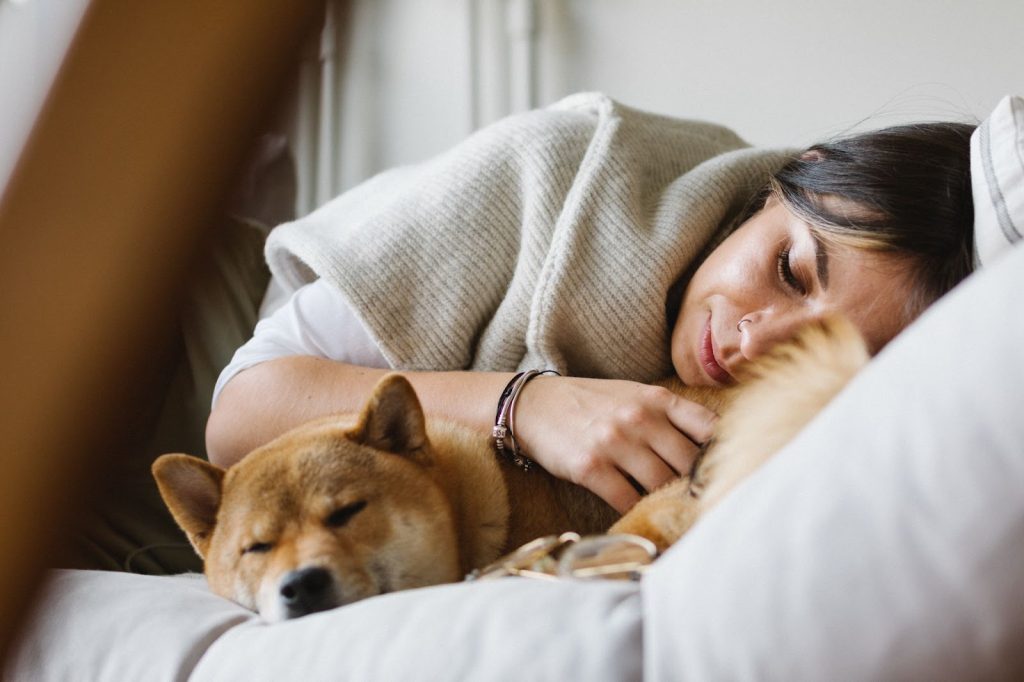It happens to the best of us. We have to get up early the next morning but just can’t get to sleep. We toss and turn all night or wake up intermittently and ruin our quality of rest. This leaves us tired, groggy and grumpy the following day. An unexpected solution that may help sleep quality, however, is to sleep with your dog.
While it may seem unintuitive, by sleeping with dogs, research suggests that you can improve your overall health and quality of sleep.
3 Advantages of Sleeping with Your Dog
Many people are hesitant about letting their pooch into the bedroom, but doing so can help you sleep better. If you’re still on the fence, don’t worry. We’ve outlined the health benefits that come from sleeping with your dog below:
1. Improved Happiness
There’s research that suggests a relationship between engaging in animal-assisted activities and reduced symptoms of depression. That said, it only makes sense that spending more time sleeping next to your dog would make you feel happier as well.
2. Reduced Anxiety
If you’re a person who can’t help but worry and stress come bedtime, it might be time to let your pup into the bedroom. There have been studies showing that interacting with dogs for as little as 10 minutes can reduce cortisol levels in the body. This means sleeping next to your dog could have potential upsides for your ability to mentally relax.
3. A Feeling of Security
In a recent study, it was found that women felt more secure sleeping with a dog partner than with a human or a cat. This makes sense, especially because dogs are so protective of their owners. With your pup at your side, you don’t have to worry as much about being caught off guard by nighttime intruders.
Best Practices for Sleeping With Your Dog
While sleeping with your dog can improve your quality of sleep, there are ways to make your new sleeping arrangement more comfortable. If you do things the wrong way, you could end up in a situation that leaves both you and your pup sleep-deprived. To help you properly adjust to sleeping with your dog, here are some helpful tips:
1. Consider a Doggy Bed
While it sounds fun to invite your pup onto the pillow next to you, that isn’t always the best solution. Depending on the dog, they could get restless at night, fidgeting in a way that prevents you from getting quality sleep. Luckily, to solve this problem all you need to do is invest in a doggy bed. That way you can keep them close by without worrying about them disturbing your slumber.
2. Enforce Boundaries
For your dog to be an ideal sleeping partner, they can’t be jumping on you and licking your face every time you go to bed. For that reason, it’s important to enforce consistent boundaries. You may even avoid playing with them in the bedroom during the day so they know the bed is for sleep only.
3. Create a Spacious Sleeping Environment
If you’re sleeping on a twin bed (or you just have a big dog), you may not have enough room for both you and your hound. If necessary, consider upgrading to a bigger mattress or have your pup sleep in a nearby doggy bed.
When to Avoid Sleeping With Your Dog
Sleeping with your dog doesn’t always work out. While it can result in better sleep hygiene for some, for others it can cause some issues. For example, if you’re allergic to dogs, your partner isn’t on board with sharing the bed with an animal or your dog isn’t trained, you’ll probably want to keep your furry friend away from the bedroom.
When you’re looking for a better quality of sleep, sleeping with your dog can be the way to go. That said, if you’re on the fence, give it a try and see how you adjust. If you aren’t experiencing great results, you can always revert to your original sleeping arrangement.
To learn more about the benefits of sleeping with your pooch, check out Tommy John’s infographic below.

Whether you are for or against co-sleeping in the bed or in the bedroom, dogs still need 12 to 14 hours of sleep per day with puppies sleeping 20 hours per day on average. Though it all depends on the breed and size, only 10 percent of a dog’s sleep is in REM, unlike humans where 25 percent of sleep is REM.
Hopefully, these tips can help you determine the best option for you as a dog owner. However, there is still always a chance your sleep disruptions are truly insomnia or sleep apnea. Our sleep specialists at The Alaska Sleep Clinic can talk for free to get you back on track for a full night’s rest.












